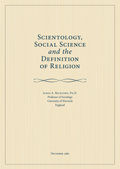A functionalist definition is one which focuses attention on the contributions allegedly made by the phenomenon in question to the stability and/or survival of a social or cultural entity. Thus, phenomena can be shown to be functional for entities ranging from the individual person to the world‑system. The fact that this manner of defining things raises many philosophical problems and has exercised the minds of many logicians has not prevented it from achieving popularity among social scientists‑especially in connection with religion.
It may be said that religion has the functional capacity:
(a) at the personal level to help people overcome problems of personality imbalance, self‑identity, meaning in life, moral reasoning, etc.,
(b) at the communal level to integrate potentially rootless people into groups and associations which provide direction and meaning in personal life as well as helpful points of reference in large‑scale societies where the individual may feel vulnerable to an all‑powerful bureaucracy or system, or
(c) at the societal level to provide legitimation for the prevailing social order; compensation for felt deprivations; and moral regulation of the interrelationships between major social institutions.
The basic teachings of Scientology on the spiritual nature of the thetan (spiritual being) and on the Eight Dynamics; the practical objectives of its training courses and counselling services; and the reverential, reflective tone of some Scientology ceremonies all persuade me that, in common with other religions, Scientology may be usefully described as functional at each of the above levels.
The basic teachings of Scientology on the spiritual nature of the thetan (spiritual being) and on the Eight Dynamics; the practical objectives of its training courses and counselling services; and the reverential, reflective tone of some Scientology ceremonies all persuade me that, in common with other religions, Scientology may be usefully described as functional at each of the above levels. This is not, of course, to claim that only religions have these functions. It is merely to argue, first, that Scientology does share them with other religions and, second, that its particular ways of fulfilling them are more closely akin in appearance and objectives to those of commonsensically‑defined religions than of, say, political groups or welfare agencies.
Defining religion in terms of function may be helpful in some cases of social scientific analysis: light can thereby be cast on many interesting aspects of its varied contribution to social life. In view of the obvious difficulty of distinguishing in this perspective between religion and ideologies, however, a functionalist definition cannot go far towards emphasising religion’s distinctiveness. For this reason a substantive definition may be more useful.





























